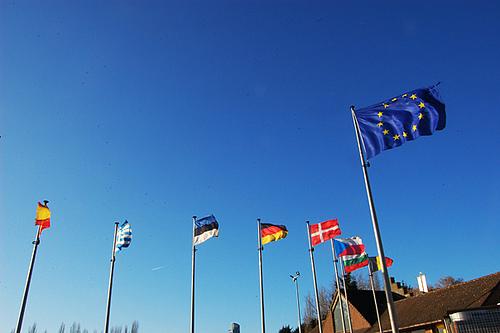Every time a major foreign policy issue divides Europe (which admittedly is rather often), critics decry a European foreign policy in shambles, saying tritely, “Europe can’t speak with one voice”. From Palestine to Russia, this faithful article never gathers dust for long in editors’ hard drives. This headline have been resurfacing en masse over the past months as the civil war in Syria has taken a turn for the worse following Bashar Al-Assad’s decision to employ chemical weapons against his own people. Yet, digging beyond the sensational headlines, one finds an impressive apparatus that is actually doing quite a lot on a day-to-day basis.
Frogs in a wheelbarrow
Looking at the messages coming out of Europe’s most important capitals, Syria is all too typical of European foreign policy responses to international crises. The UK sits impotently on the sidelines after the House of Commons refused to give Prime Minister David Cameron a free hand to commit military assets to the US-led response. In Paris, as the opposition becomes more virulently opposed, an embattled François Hollande dithers on whether to proceed by presidential decree or try, like Obama, to cover his back and push a vote through the Assemblé Nationale. Finally, in Berlin and Brussels, Chancellor Merkel and the EU’s top diplomat Lady Cathrine Ashton seem to be straddling the fence pushing for a diplomatic denouement to the crisis.
However, a common fallacy underlies the assumption that the EU should be speaking with one voice on matters of such importance: that Member States are supposed to all agree in the first place. While the past half-century has witnessed once unthought-of levels of responsibilities delegated to the EU, foreign policy is one that national capitals have kept squarely in their domain of core competencies. After all, the EU brings together a highly diverse group of countries, each with distinct national histories, spheres of influence and foreign policy traditions (atlanticism, neutrality, europeanism etc). One cannot then blame the EU for something that it has no vocation do without unanimous consent.
It seems doubtful that the EU will ever be able to truly super-nationalise the foreign policy process any time soon given this diversity. The feat could probably be most aptly described as pushing a wheelbarrow full of frogs through a minefield, to put a military twist on the old saying. Admittedly though, there is obviously an argument to be made for speaking with a single voice. Together, Europeans stand a much better chance of making themselves heard on pressing international issues. From an economic standpoint as well, closer cooperation in defence policy could eliminate a lot of redundancies and save millions, if not billions, of Euros, while making Europeans collectively safer.
Looking beyond the headlines
Focusing on this frog-in-a-wheelbarrow dimension of European foreign policy, however, detracts from all that Europe has already accomplished in this domain. Unfortunately, the many parts of foreign policy that are conducted at the EU level are somewhat less glamorous than standing up to Russia or orchestrating retaliations against Syria. Given this, it is worthwhile to remind readers of a few things that the EU foreign policy apparatus handles on a daily basis and, one might be so bold as to add, quite well:
- The EU is one of the largest development aid donors in the world and pooling resources on the EU level makes EU aid more effective and efficient. When you tack on bilateral and multilateral contributions made directly by Member States, Europe is the largest contributor. In 2011, this represented 53,1 billion Euros.
- EU Neighbourhood policy, an umbrella term for all the cooperation the EU pursues with neighbouring countries through various instruments, is highly effective in bringing about political, economic and social reform. The possibility of membership or even just closer cooperation is a powerful tool that the EU is constantly leveraging to nudge countries in the right direction.
- The EU has led peacekeeping actions all over the world, including Bosnia, Chad, Central African Republic and the Congo to name several recent deployments. The EU has also developed a number of joint rapid reaction forces, such as Eurocorps and the European Maritime Force, that allow it to jointly respond to international security crises.
Sadly, this is a well known phenomenon for supporters of the EU: rarely does the EU excel while everyone’s watching. The EU performs many thankless tasks everyday that are essential for the smooth functioning of the life that Europeans have come to cherish. It is often when the world’s eyes are fixed on it that European leaders drop the ball. In a sense, the EU was in no way envisioned by the Member States that constructed it to function during situations that demand decisive action, these being the exact times when national, directly-elected leaders want the last say. While its competencies have grown drastically over the past decades, it is still very much an organisation anchored in its functional origins.





